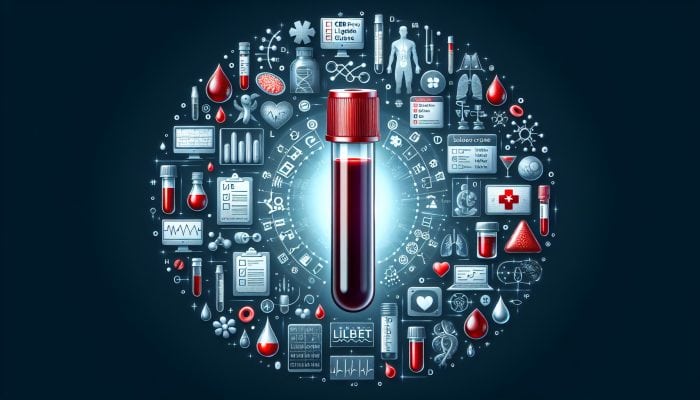Comprehensive Guide to Well-Person Blood Tests: Understanding Their Importance
Exploring Well-Person Blood Tests: Key Benefits for Your Health

Well-Person Blood Tests in Ashington are pivotal in offering thorough health screenings that meticulously assess various aspects of your health through detailed blood analysis. These vital assessments go beyond routine checks; they are instrumental in identifying early warning signs of diseases, supporting overall wellness, and delivering deep insights into how your body functions. A typical well-person blood test encompasses a variety of essential evaluations, which may include:
- Complete Blood Count (CBC)
- Lipid Profile
- Blood Glucose Test
- Liver Function Tests
- Thyroid Function Tests
- Kidney Function Tests
- Vitamin D Levels
- Electrolyte Panel
The true value of these tests is manifested in their unique ability to uncover hidden health issues that may not exhibit any noticeable symptoms. By meticulously analysing the various components within your blood, healthcare professionals can formulate a comprehensive picture of your overall health status, thereby enabling timely and effective interventions that can significantly enhance your quality of life.
The Essential Role of Regular Health Screenings in Maintaining Your Well-Being
Engaging in regular health screenings, particularly well-person blood tests, is crucial for the early identification of potential health concerns. These proactive health measures pave the way for timely interventions, which can dramatically enhance health outcomes and potentially save lives. By prioritising health management through these tests, individuals can work diligently towards achieving long-term vitality and well-being. For example, the early detection of elevated cholesterol levels can prompt necessary lifestyle modifications or treatments that significantly lower the risk of developing heart disease in the future. Ultimately, routine screenings empower individuals to take charge of their health journey and make informed, proactive decisions.
Key Steps for Preparing Effectively for Your Blood Test
Preparation for a well-person blood test is essential to ensure that the results are accurate and trustworthy. Depending on the specific tests ordered, it may be necessary to fast for 8 to 12 hours prior to the blood draw. Additionally, it is important to avoid certain medications that could potentially interfere with the test results; however, it is always wise to consult your healthcare provider regarding any medications you are currently taking. Staying well-hydrated is also crucial, as it can facilitate the blood draw process. Adhering to the detailed instructions provided by your healthcare provider is vital for achieving optimal test outcomes and ensuring that your health is accurately assessed.
Expert Insights on the Importance of Well-Person Blood Tests in Ashington

Key Insights from Healthcare Professionals on Well-Person Blood Tests
Healthcare experts consistently recommend the routine implementation of well-person blood tests due to their capacity to provide a comprehensive evaluation of an individual’s health. Many medical professionals assert that these tests are essential for the early diagnosis of potential health issues, which can lead to significant improvements in patient outcomes. For instance, identifying elevated blood sugar levels during a routine examination can catalyse early interventions for diabetes management, greatly improving the patient’s quality of life. Numerous real-world cases illustrate how early detection through these assessments has halted the progression of serious diseases, underscoring their vital role in preventive healthcare.
Transforming Your Health Management Through Well-Person Blood Tests
Well-person blood tests represent a proactive approach to health management by detecting potential health challenges before they evolve into noticeable symptoms. This early identification empowers healthcare providers to implement preventive measures, which may include lifestyle changes or targeted treatments. For example, if a blood test reveals thyroid dysfunction, timely medical interventions can be initiated to avert further complications. Moreover, these tests prove invaluable in monitoring the effectiveness of ongoing treatments for existing health conditions, ensuring that patients receive the most appropriate care tailored to their unique health needs.
What to Anticipate from Your Blood Test Results

The outcomes of a well-person blood test can provide essential insights into various health metrics, including cholesterol levels, blood sugar, kidney function, and liver enzyme levels. Understanding these results is crucial for making informed health decisions. For instance, if your cholesterol levels are found to be elevated, your healthcare provider may recommend dietary adjustments or medications. It is imperative to discuss these results with your healthcare provider, who can elucidate their implications in relation to your overall health and recommend any necessary follow-up actions to ensure optimal health management.
Where to Find Well-Person Blood Testing Services in Ashington
Your Guide to Local Clinics Offering Comprehensive Blood Testing Services
In Ashington, numerous clinics provide well-person blood tests, ensuring that residents have convenient access to essential health screenings. Selecting a reputable clinic staffed with qualified professionals is critical for obtaining accurate and reliable results. Some of the prominent clinics in Ashington where you can receive blood tests include:
- Ashington Health Centre
- Northumberland Medical Group
- Boots Pharmacy Health Clinic
- Well Pharmacy
- Simply Health Clinic
- Vitality Health and Wellness
Each of these clinics is esteemed for its commitment to patient care and offers a diverse array of comprehensive testing options, making them excellent choices for individuals seeking blood tests to safeguard their health.
Financial Considerations for Blood Testing in Ashington
The cost associated with a well-person blood test in Ashington can fluctuate significantly based on the clinic’s pricing policies and the range of tests conducted. Some clinics may provide package deals, which can be more economical than ordering tests individually. On average, individuals can expect to spend between £50 and £150, depending on the specific tests performed. It is advisable to inquire with the clinic about specific pricing structures and any available discounts, particularly for those looking to undergo multiple tests simultaneously.
Scheduling Your Blood Test Appointment: A Simple Process
Arranging a well-person blood test in Ashington is a straightforward task. Most clinics feature user-friendly online booking systems that allow you to schedule your appointment at your convenience. Some clinics may require a referral from your GP, so it is essential to verify this requirement before attempting to book your test. Always confirm the availability of the specific tests you need and any preparatory instructions to ensure that you are fully equipped on the day of your appointment.
Exploring the Advantages of Regular Well-Person Blood Tests
Key Benefits of Regular Blood Tests for Your Health
Regular well-person blood tests provide an array of benefits, including the early detection of diseases, monitoring of existing health conditions, and facilitating comprehensive health management. Engaging in these screenings can offer peace of mind, empowering individuals to adopt a proactive approach to their health. Regular testing enables healthcare providers to identify anomalies early on, leading to more effective treatment strategies. Additionally, these tests inspire patients to embrace healthier lifestyles by presenting tangible health metrics that prompt self-reflection and proactive action.
Preventing Serious Health Conditions with Well-Person Blood Tests
By identifying health risks at their early stages, well-person blood tests play an essential role in preventing the emergence of serious health conditions such as heart disease, diabetes, and various forms of cancer. Early intervention is vital for improving health outcomes, as it allows for timely lifestyle adjustments, medications, or other treatments to be initiated before conditions escalate. For example, regular monitoring of cholesterol and blood pressure can significantly reduce the risk of cardiovascular events, highlighting the critical importance of proactive health management.
Enhancing Quality of Life Through Ongoing Health Monitoring
Consistent health monitoring via well-person blood tests can lead to a substantially improved quality of life. By keeping track of essential health indicators, individuals can make informed lifestyle choices and seek timely medical advice when necessary. For instance, if a blood test reveals elevated blood sugar levels, the patient can proactively implement dietary changes and increase physical activity to effectively manage their levels. This empowerment not only enhances physical health but also positively influences mental well-being, enabling individuals to feel more in control of their health journey.
Facilitating Personalized Medicine Through Blood Testing
Well-person blood tests generate invaluable data that can be leveraged to tailor medical treatments to individual needs, thereby enhancing the effectiveness of health interventions. Personalized medicine focuses on utilizing a patient’s unique genetic, lifestyle, and environmental factors to develop highly specific treatment plans. Blood tests can uncover particular markers that inform healthcare providers about the most effective treatments or lifestyle adjustments for that individual, ensuring a more targeted and effective approach to health management.
How Well-Person Blood Tests Affect Health Insurance and Employment Opportunities
Regular well-person blood tests can profoundly impact health insurance premiums and employment prospects. Many health insurance providers consider the frequency of health screenings when determining rates, with individuals who consistently undergo regular testing often benefiting from more favorable premiums. Moreover, demonstrating a commitment to health through these tests can positively influence potential employers by showcasing responsibility and a proactive approach to wellness—traits that are increasingly valued in today’s competitive job market.
Research-Based Benefits of Well-Person Blood Tests in Ashington
Insights from Current Research on Well-Person Blood Tests
Research consistently demonstrates that well-person blood tests can significantly enhance health outcomes by facilitating the early detection and management of various conditions. Studies indicate that individuals who participate in regular testing tend to experience better long-term health compared to those who do not engage in such practices. To effectively interpret research findings, consider actionable steps such as seeking studies published in reputable journals, focusing on sample sizes and demographics relevant to your health profile, and discussing findings with your healthcare provider for contextual understanding.
The Role of Well-Person Blood Tests in Shaping Public Health Initiatives
Well-person blood tests are integral to public health initiatives as they enable early diagnosis and treatment of diseases. This proactive approach helps mitigate the overall burden on healthcare systems, as undiagnosed conditions can escalate into severe health complications that require extensive resources to manage. By promoting awareness and accessibility of blood tests, public health campaigns can encourage greater participation in screenings, ultimately enhancing the overall health of the community and reducing healthcare costs.
Long-Term Health Benefits Associated with Regular Blood Testing
The long-term advantages of well-person blood tests include a reduced risk of chronic diseases, improved life expectancy, and enhanced overall health management. Regular screenings are foundational to preventive medicine, allowing individuals to maintain optimal health and avert complications associated with untreated conditions. Continuous health management can be bolstered through regular monitoring, ensuring that any changes in health status are addressed promptly and effectively, thus promoting a longer, healthier life.
Accessing Well-Person Blood Tests in Ashington: A Community Resource
Residents of Ashington can access well-person blood tests through various local healthcare providers, private clinics, and community health programs. The availability of these services is extensive, ensuring individuals can easily find options that cater to their specific needs. Many NHS services also include certain blood tests, improving accessibility for those concerned about financial implications. Engaging with local health initiatives can further enhance access to these essential screenings, fostering a healthier community overall.
Understanding Costs and Insurance Coverage for Blood Tests
The costs associated with well-person blood tests can differ, with many being covered by NHS services or private health insurance plans. This coverage enhances accessibility for a diverse range of individuals in Ashington. Patients should consult with their insurance providers to clarify specific coverage details and any potential out-of-pocket expenses that may arise. Moreover, some clinics offer payment plans or discounts for upfront payments, facilitating more financially feasible testing options for all patients.
Deciphering Your Blood Test Results: A Step-by-Step Guide
How to Effectively Understand Your Blood Test Results
Interpreting your blood test results requires an understanding of the normal ranges for various markers and the significance of any deviations from these norms. Normal ranges can vary according to factors such as age, sex, and other variables, making it imperative to discuss your results with your healthcare provider. Key blood markers commonly evaluated include:
- Haemoglobin — Indicates the blood’s oxygen transport capability
- Glucose — Reflects your blood sugar levels
- Cholesterol — Assesses cardiovascular health
- Creatinine — Evaluates kidney function
- ALT/AST — Indicates liver health
- Thyroid Hormones — Assesses thyroid function
Each of these markers provides crucial insights into your overall health, and any deviations can prompt further investigations or necessary actions to maintain your well-being.
Insights Gained from Various Blood Markers About Your Health
Diverse blood markers can reveal different dimensions of your health status. For instance, elevated liver enzymes (ALT and AST) may suggest liver inflammation or damage, while high glucose levels could indicate diabetes or prediabetes. Understanding the significance of each marker is essential for accurately interpreting your results. Additionally, cholesterol levels are crucial for evaluating cardiovascular risk, while kidney function markers like creatinine can inform you about your renal health status. Collaborating with a healthcare provider to decode these markers can lead to informed health decisions that enhance your overall well-being.
When to Follow Up on Your Blood Test Results
Following up on your blood test results is essential, especially if any markers fall outside the normal range. Your healthcare provider will advise on the appropriate timing and nature of follow-up required based on your findings. For example, if a test indicates elevated cholesterol, your provider may suggest additional tests or lifestyle changes within a specified timeframe. Regular follow-up ensures that any potential health issues are managed proactively, significantly decreasing the risk of complications and promoting long-term health.
Choosing the Right Clinic for Your Blood Test in Ashington
Key Criteria for Selecting a Suitable Clinic
Selecting a clinic for your well-person blood test requires careful consideration of several factors, including reputation, cost, convenience, and the range of tests offered. It is crucial to feel comfortable and confident in your choice. Checking for accreditation and certifications can provide valuable insights into the clinic’s quality. Furthermore, assessing the availability of experienced staff and the variety of tests offered can significantly influence your overall experience and the accuracy of the results you receive.
How to Evaluate the Quality of a Clinic
Assessing the quality of a clinic involves examining patient reviews, clinic accreditation, and the expertise of the staff. High-quality clinics often exhibit transparent processes and receive positive feedback from patients. Look for testimonials that highlight patient experiences, particularly regarding the professionalism of the phlebotomists and the clarity of results provided. A reputable clinic prioritizes patient comfort and fosters a supportive environment conducive to effective health screenings.
Expected Services from a High-Quality Clinic
When selecting a clinic for a well-person blood test, seek those that offer a comprehensive array of tests, employ skilled phlebotomists, and provide clear, understandable results. Some clinics may also offer supplementary health services, such as nutritional counselling or chronic disease management, which can be beneficial for holistic health monitoring. The availability of online results and easy access to healthcare professionals for follow-up inquiries are additional advantages to consider when making your choice.
Essential Preparations for Your Well-Person Blood Test
Necessary Preparations Before Undergoing Your Blood Test
Before your well-person blood test, it is paramount to adhere to any fasting instructions provided by your healthcare provider, which may involve abstaining from food or drink for a specified period. Additionally, be mindful of any medications you are currently taking, as some may need to be temporarily halted prior to the test. Staying well-hydrated can facilitate the blood draw process, so ensure you consume plenty of water unless otherwise instructed. Confirm any specific preparation requirements with your clinic ahead of your appointment to ensure a seamless experience.
Effective Strategies to Manage Pre-Test Anxiety
Feeling anxious before a blood test is a common experience, but there are effective strategies to help manage this anxiety. Deep breathing exercises can assist in calming your nerves, along with focusing on the positive aspects of undergoing the test. Distraction techniques, such as listening to music or engaging in conversation with the phlebotomist, can also help alleviate feelings of anxiety. Mentally preparing by understanding the process and what to expect can empower you and reduce fear, contributing to a more comfortable testing experience.
Essential Items to Bring to Your Blood Test Appointment
When attending your appointment for a well-person blood test, it is crucial to bring your ID, any necessary referral forms, and a list of medications you are currently taking. Some clinics may require payment or insurance information at the time of the test, so ensure that you have these details readily available. Being well-prepared with all necessary documents can streamline the process, ensuring that everything runs smoothly and allowing you to focus on your health rather than logistical matters.
What to Expect During Your Blood Test Procedure
During your blood test, a qualified phlebotomist will draw blood from a vein, typically located in your arm. The entire process is quick and generally involves a slight pinch or pressure sensation. After the blood is collected, a small bandage will be applied to the site. Expect the entire procedure to take just a few minutes. Knowing what to anticipate can help alleviate any anxiety you may have about the process, contributing to a more comfortable experience overall.
Post-Test Actions and Follow-Up Steps
Steps to Take After Receiving Your Blood Test Results
Once you have received your blood test results, it is essential to discuss them with your healthcare provider to understand any necessary follow-up actions or lifestyle modifications required. This conversation ensures that you are fully informed about your health status and the implications of the results. Your provider can help interpret what the numbers signify and guide you towards appropriate next steps, whether that involves further testing or adjustments in habits to enhance your health.
Recommended Frequency for Scheduling Well-Person Blood Tests
The recommended frequency of well-person blood tests can vary based on factors such as age, health status, and family history. Generally, adults are advised to undergo screening at least once a year; however, your healthcare provider can offer tailored recommendations based on your specific health profile. For example, individuals with a family history of certain conditions may require more frequent screenings to ensure timely detection and management of potential health issues.
What to Do if Abnormalities Are Detected in Your Results
If your blood test results reveal abnormalities, your healthcare provider may recommend further testing to clarify the findings. They might also suggest lifestyle modifications or treatment options based on the nature of the abnormalities. It is crucial to adhere to their guidance closely to effectively manage your health. Taking prompt action can prevent potential health issues from escalating and improve your overall well-being, leading to a healthier future.
Preparing for Future Blood Tests: Best Practices
To ensure accurate results for future blood tests, it is vital to follow your healthcare provider’s instructions regarding fasting, medication adjustments, and other preparations. Proper preparation is key to obtaining reliable outcomes. Staying informed about the specific requirements for each test can help you avoid unnecessary complications or inaccuracies in your results, ultimately supporting your health management journey and fostering a proactive approach to your well-being.
Potential Lifestyle Changes Suggested by Your Healthcare Provider
Based on the results of your blood test, your healthcare provider may propose various lifestyle changes aimed at enhancing your health. These recommendations could include dietary modifications, increased physical activity, or stress management techniques. Implementing these changes is essential for preventing future health issues and optimizing your overall well-being. Tailored advice can empower you to make informed decisions that align with your health objectives and long-term aspirations, ultimately leading to a more fulfilling and healthier life.
Frequently Asked Questions (FAQs) About Well-Person Blood Tests
What is the primary purpose of a well-person blood test?
A well-person blood test serves as a thorough health screening designed to analyse various health markers, assessing overall wellness and identifying early signs of potential diseases.
How often should I schedule a well-person blood test?
Typically, it is advisable to have a well-person blood test at least once a year; however, your healthcare provider may recommend more frequent tests based on your individual health status and risk factors.
What can I expect during the blood test procedure?
During a blood test, a qualified phlebotomist will take a sample of blood from your vein, usually in your arm. The process is quick, and you may feel a slight pinch during the draw, but the discomfort is minimal.
What preparations are necessary before undergoing a blood test?
Preparation may involve fasting for a specific period, avoiding certain medications, and ensuring hydration. Always follow your healthcare provider’s specific instructions regarding preparation to ensure accurate results.
What steps should I take if my test results are abnormal?
If your test results are abnormal, your healthcare provider will recommend further testing or treatment options. It’s crucial to thoroughly discuss these results with your provider to understand the next steps and implications.
Are well-person blood tests typically covered by insurance?
Many well-person blood tests are covered by NHS services or private health insurance plans, making them accessible to a broad spectrum of individuals and promoting preventive healthcare.
What common tests are typically included in a well-person blood test?
Common assessments may include a Complete Blood Count (CBC), lipid profile, blood glucose test, liver function tests, and thyroid function tests, among others.
How can I locate a clinic for a blood test in Ashington?
You can find clinics in Ashington by searching online for local healthcare providers or community health centres that offer blood testing services tailored to your needs.
What is the typical wait time for blood test results?
Generally, blood test results can take anywhere from a few days to a week to be processed and returned, depending on the clinic and the specific tests performed.
Can I eat before my blood test?
Whether you can eat before your blood test depends on the specific tests being performed. Some tests require fasting, while others do not. Always verify with your healthcare provider regarding specific dietary instructions prior to your test.
Connect with us on Facebook!
This Article Was First Found On https://bloodtest.co.uk
The Article Blood Test in Ashington: Your Essential Health Checkup Was Found On https://limitsofstrategy.com

